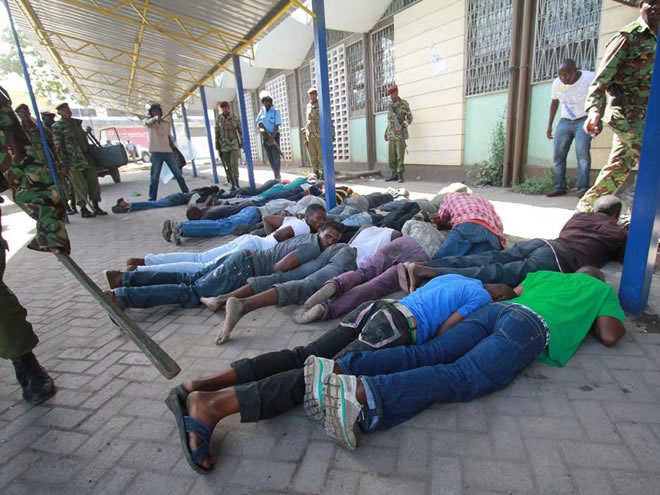
Thursday, June 30, 2016
By CALVIN ONSARIGO

The 24 youths arrested at Majengo, Mombasa, for demonstrating following the killing of Muslim clerics on 2013. /FILE
The Kenya government Counter Violence Extremism programme in Kwale in south coast is in a limbo following the growing mistrust among al Shabab returnees and the security agents in the region, the Star can report.
This comes just few weeks after the killing of three nyumba kumi officials and one reformed al Shabab returnee in Bongwe area Kwale.
The four had come out openly to oppose the extremism ideologies of the al Shabab militia group, which has managed to radicalize hundreds of youth mainly from south coast for decades under the watch of security agents.
The slain government agents, Mohammed Juma Mwaguzo, Juma Omar Mwanyota, Hassan Debe and Subira Sudi Mwangole were all shot dead by gun-wielding suspects riding on motorcycle.
Mwangole, who was an al Shabab returnee, had gone to Somali in 2008 and trained with the militia group before returning to Kenya the following year.
Last year, Mwangole was among five al Shabab returnees that were interviewed by the Star on how they joined the outfit before coming to Kenya and surrendered to the government.
He was among 74 returnees that had joined the Kenya Counter Violence Extremism programme and become parts of the agents helping in dealing with terrorism in the country.
Autopsy reports indicate that the four were systematically executed after being shot at close range in the head with bullet fired from an AK-47 rifle and all died instantly.
The victims were known to their killers because they called them by their names before executing them, according to witnesses.
According to government, there are over 1,500 al Shabab returnees in the country and quite a bigger number surrendered to the State Amnesty Programme announced last year.
A group of former 54 radicals and extremists had surrendered and have been integrated in the programme, according to Evans Achoki, the former Kwale County commissioner, who has been transferred to Murang’a.
They were given motorbikes as way empowering them economically.
Achoki says: “The killing of the four officials is a set back to the Counter Extremism programme, but we are hopeful that it will continue without any further issues.”
After the killing of the four officials, intelligence report show that local administrators, who include the chiefs and nyumba kumi ambassadors, have fled their homes over fears of being eliminated by the al shahab returnees.
Kinondo and Bongwe area chiefs are among those targeted and have opted to live in undisclosed places away from the families because of their safety concerns.
Bongwe village is the hotbed of the radicalization and the latest killings, according to government reports.
The 15 Kilometre-square -village has a population of about 4,000 villagers mainly from Digo and the Duruma communities.
Intelligence reports indicate that 10 per cent of al Shabab returnees are from Bongwe village.
“Our records show that there are almost 80 al Shabab returnees within Bongwe area currently, most of these young men have either undergone training locally or inside Somali,” says a senior government official, who cannot be name because of the sensitivity of that matter.
The returnees have managed to control the entire Bongwe area and areas around Diani where they have managed to instill fears among government officials and residents.
The Star has established that despite heavy deployment of officers and recent visit by Inspector General of Police Joseph Boinet in Bongwe nothing much has been achieved.
Police officers are operating blindly, there is no cooperation from locals and religious leaders, everybody is living in fears, security apparatus are caught in complex situation,” says the official.
On 30 June 10, 2016 Police have circulated the photos and names of eight wanted al Shahab returnees.
Ali Haji Kolagwa, Ali Salim Mwagutsi, Said Athman Mjinga ,Said Hassan Seti, Ali Hamisi Mwaligulu ,Ali Musa Mwagutsi ,Hamisi Musa Mwaligulu and Alfan Juma Mwakambirwa .
Security analysts and religious leaders hold the opinion that the government approach has been unsuccessful posing major security threat to coast region and entire country that has witnessed relative calm.
Suprem council of Kenya (Supkem) said the government must review the counter terrorism operation saying the alleged extrajudicial killings and enforced disappearances of suspects by security agencies is counter -productive .
The Anti -Terrorism Police Unit (ATPU) has been accused of killing of key al Shabab suspects from coast including Islamic preachers’ sheikh Aboud Rogo, Samir Khan and Hassan Mwayuyu.
The three were blamed for indoctrinating thousands of Kenyan youth from Kwale and Mombasa and successfully managed to foment hatred among Muslims and Christians in south coast.
Despite the killing, their shadows are still haunting the security apparatus that are grappling on how to deal with thousands of Kenyans youth fighting in Somalia and returnees.
Supkem chairman Prof. Abdulghafur el-Busaidy said the country is sitting on a time bomb unless the government reviews the its strategies on fighting terror, warning that killing of key leaders is not solution.
“It’s upon the government to check who is sustaining the radicalized youth, how they can be helped since they are bitter that the leaders they looked upon are no more. It’s difficult to monitor them, ”said Abdulghafur
Supkem chairman coast region Sheikh Mudhar Kitammy said they handed over report to the government on effective way of tacking radicalized youth but it has not been implemented.